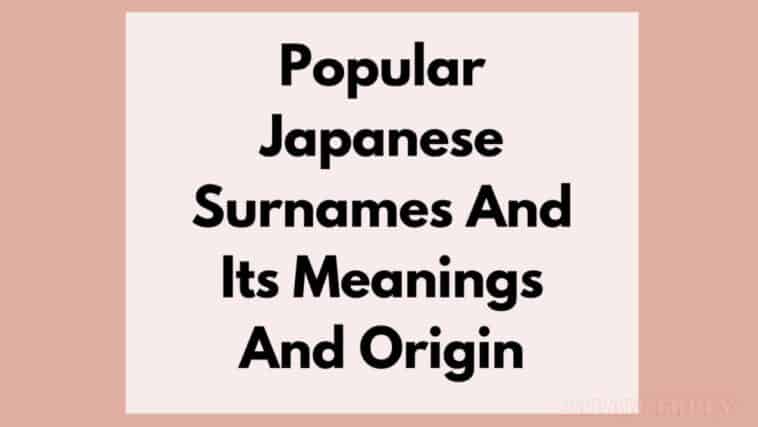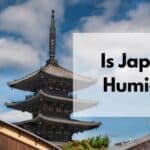Want to know the popular Japanese surnames used in Japan? Check out the list of widely used surnames with their meanings and origin right below!
Japanese surnames are more than mere identifiers; they are steeped in history and meaning, often reflecting geographical origins or ancestral occupations.
These names serve as a window into the past, telling stories of lineage and cultural heritage. Let’s embark on a journey to uncover the meanings and origins of popular Japanese surnames.
Page Contents
Popular Japanese Surnames And Its Meanings And Origin
Here are some of the Japanese surnames with their meanings and origin.
Abe

One of the popular surnames in Japan which has two kanji letters. The first kanji letter means “peace” and the second kanji letter can mean “several times”. Abe is also a widely used name in northeastern Japan.
- Related: How Japanese Names Work?
- Related: Cool Japanese Last Names
- Related: Common Japanese First Names
Abhuraya
Abhuraya has two kanji characters, the first kanji character means “oil” while the second kanji character means “valley”.
Adachi
The name Adachi originates from a samurai clan. The meaning of Adachi is “feet” or “stand” and the name can have several variations, for example, Adachihara has a similar meaning to Adachi.
Akiyama
Akiyama can be a surname or a popular girl’s name in Japan. The meaning of Akiyama is “autumn mountain” and Akiyama originated in eastern Japan.
Aoki
A name that originated in Central Japan from the Minamoto clan. The meaning of Aoki is “green tea”.
Arima
The meaning of Arima is “own a horse” and it’s a widely used name in the Ryukyu Islands and Western Japan. The name can also be based on a geographical location such as Arima Hot Spring in Kobe.
Ashikaga
A popular surname in Japan during ancient times when the Ashikaga family was prevailing in war. Ashikaga means “place of reeds” or “advantage”. It’s also a name derived from a geographical location in Tochigi Prefecture.
Bando
It’s a common surname in Eastern Japan and it means “east of a slope” referring to where the name originated from.
Bushida
Bushida means “samurai” and “paddy field”.
Chiba
Chiba is a prefecture in Japan and it means “a thousand leaves”.
Chinen
Originated from the Ryukyu Islands and means “a thousand years”.
Daigo
A surname derived from the 60th emperor of Japan and it also refers to a temple in Kyoto called Daigo Shingon Buddhist temple.
Doi
A versatile name with different interpretations. One common interpretation is “earth” or “land” and originated in eastern Japan.
Eguchi
A name originated from Kyushu Island and the meaning is “the river’s mouth”.
Endo
A popular name in Eastern Japan used by the clans of Fujiwara and Taira. It means “distant wisteria”.
Fuji
A name derived from the Fujiwara clan and means “wisteria”.
Fujihara / Fujiwara
Originated from one of the mighty clans of Japan and it means “wisteria plain”.
Fujimoto
Also derived from the Fujiwara clan and it means “person living under a wisteria tree”
Fujisaki
It means “two unbloomed wisteria flowers”.
Fukushima
A popular Japanese surname that means “fortune island”.
Genji
One of the prominent clans in ancient Japan. Genji means “two beginnings”.
Goto
Descended from one of the Japanese aristocratic families and a popular name in southeastern Japan.
Hada
A popular name in Eastern Japan and it means feather and rice paddy.
Hajime
Command used in martial arts and it means beginning.
Hamada
A name used by several noble Japanese clans. It means “seashore rice paddy”.
Hamamoto
Means “one near the seashore” and is a common name used in Western Japan.
Handa
Means half a rice paddy or flower field. Originated in Osaka and Nara Prefectures.
Hattori
A name of Korean or Chinese origin and means ‘silkworm growers’.
Ichikawa
A name derived from the Taira clan it means “city river”.
Ida
A popular name in Eastern Japan and it means “rice paddy near the well”.
Igarashi
A name originated from the Igarashi river and it means “fifty storms”.
Imada
Imada is a name derived from the Taira clan and it means “new rice field”.
Kagawa
It means “fragrant river” derived from the Kagawa family in Hiroshima prefecture.
Kaneko
A popular name in Tokyo and Okinawa and it means “golden child”.
Kawasaki
It’s a popular name in Eastern Japan and it means “river cape”.
Kishimoto
A common name in Western Japan and it means “person living near the beach”.
Kobayashi
One of the common surnames in central Japan. It means “small forest”.
Kondo
A popular surname in Tokyo and it means “near wisteria”.
Machida
Prominent name in Eastern Japan and it means ‘town paddy field”.
Matsui
A popular ancient name that means ‘pine tree well’.
Miyamoto
It means a person living in the shrine and is a common name in eastern Japan.
Miyazaki
A prefecture in Japan and it means ‘shrine cape’.
Mochizuki
It means “full moon” and is a popular name in Nagano Prefecture.
Moriyama
A habitational name from the regions of Aichi, Toyama, and Fukushima Prefectures. The name means “forest mountain”.
Murayama
A common name in eastern Japan and it means “mountain near the village”.
Nagano
This is a common name of an area in Japan that means “long field”. It originated from the eastern and western parts of Japan.
Nagasawa
A common name in central Japan and it means “long swamp”.
Nakashima
It’s a habitational name and it means “center island”.
Nakamura
An ancient Japanese name that means “middle village”. It’s also one of the most common surnames in Japan.
Nishida
A popular name originated from western Japan and Okinawa Island. It means “western rice field”.
Nishikawa
A surname that originated from a samurai clan and it means “western river”. A common name in Western Japan.
Nishiyama
A popular place and surname especially in western Japan and it means “western mountain”. Origin from Fujiwara clan.
Noguchi
Possibly connected to a samurai clan. It means “field entrance” and is a common surname in southeastern Japan.
Nonaka
The name means “person in the middle of the field”. It’s a popular name in eastern Japan.
Oba
A name originated from a samurai family which is popular in the Ryukyu Islands. It means “huge garden”.
Obara
A habitational name that means “small plain”. It originated from the Sasaki family.
Ogata
A name derived from the Oita Prefecture and it means “beginning direction”.
Oishi
The name means “big rock” and it’s common in eastern Japan.
Okamura
A common name in western Japan and it means “village hill”.
Osaki
A famous family name from the Minamoto clan and prevalent around eastern Japan. It means “great cape”.
Oyama
It means “small mountain” which was descended from a Fujiwara clan.
Saito
This surname can be written in various forms and is a popular name in northeastern Japan. The name descended from Fujiwara no Nobumochi.
Sakaguchi
A common name in western Japan that means “person living in the mouth of the slope”.
Sakurai
The name means “cherry blossom well” and is prevalent across eastern Japan.
Shiba
In western Japan Shiba means “turf” and in eastern Japan Shiba means “brushwood”.
Shimamoto
A popular name in western Japan and it means “the person from the island”.
Shiraishi
It means “white rock” and is a popular name in central Japan.
Sugiyama
A habitational name from Mikawa that was derived from the Fujiwara clan. It means “cedar”
and “mountain”.
Sumida
The name means “corner rice field” and is a popular name in Fukuoka Prefecture.
Suzuki
One of the common surnames in Japan that means “bell tree”. Suzuki is a famous family name descended from the Mononobe clan.
Tachibana
A surname originated from an imperial family and it means “wild orange”.
Takahashi
One of the common Japanese surnames which means “tall bridge”.
Takashima
A popular surname in western Japan that means “tall island”.
Takayama
A city in Hida, Japan, and it means “tall mountains”.
Tanaka
One of the common Japanese surnames which means “middle of the rice field”. A prevalent surname in Osaka city.
Toyama
A noble surname that means “abundant mountains”. Originated from the Nagano Prefecture.
Toyoda
One of the most popular names in Japan that mean “fertile rice field”.
Tsutsui
A habitational name originated from Yamamoto village. It means “round well”.
Uchida
A common surname in Japan that means “inner rice fields”. It’s a name that originated from a samurai family.
Umeda
A surname derived from the Minamoto family that means “plum rice field”.
Usui
A popular name in eastern Japan that means “mortar well”.
Wada
A habitational name that originated from the Miura Peninsula. It means “harmonic rice field”.
Watanabe
A popular Japanese surname that originated from a samurai family. Watanabe means “ferrymen’s club”.
Yamada
It means “mountain rice field” and is a popular surname in eastern Japan.
Yamaguchi
A famous place in Japan and a name that originated from western Japan. It means “mountain’s entrance”.
Yamamoto
One of the popular surnames in Japan that’s prevalent across central Japan. It means “person living in the mountains”.
Yamashiro
A popular surname in western Japan that means “mountain castle”. Yamashiro is a habitational name that originated from Nara.
Yamazaki
A name originated from a samurai family that’s popular in western Japan. It means “mountain peninsula”.
Yasuda
A habitational name derived from notable families in Japan. It means “cheap rice field”.
Yoshida
It means “fortunate rice field” and a habitational name that’s common in western Japan.
Yoshimura
A prevalent name in western Japan that means “fortunate village” and possibly originated from a samurai family.
The Traditional Naming System in Japan
Before we get to the meanings and origin of Japanese surnames, it’s advisable to familiarize ourselves with the naming traditions in Japan.
The history of Japan mentions how clans were prevalent during ancient times and the people began using a different approach to refer to themselves.
This approach was to use geographical locations or their occupations as their surnames which would be practiced among clans in Japan around 300 BC. This also helped each clan differentiate from the rest and allow them to sustain their clan’s reputation.
After the clans were formed into kingdoms, the ruler of the kingdom came up with a new naming system called Uji Kabane which is a system that involves having surnames based on a person’s societal status.
Since surnames in Japan indicate a person’s ancestry or societal status, they’re written right before a person’s real name, and a person is often addressed by their surname in Japan. However, a relative or a friend of a person can address them by their real name.
Japanese names are written in kanji or hiragana characters and they’re ideograms which means each character can have a different meaning depending on the context.
Therefore the meanings of the surnames we’ve given below may have multiple meanings; however, we’ve only mentioned the widely used interpretations of such names.






